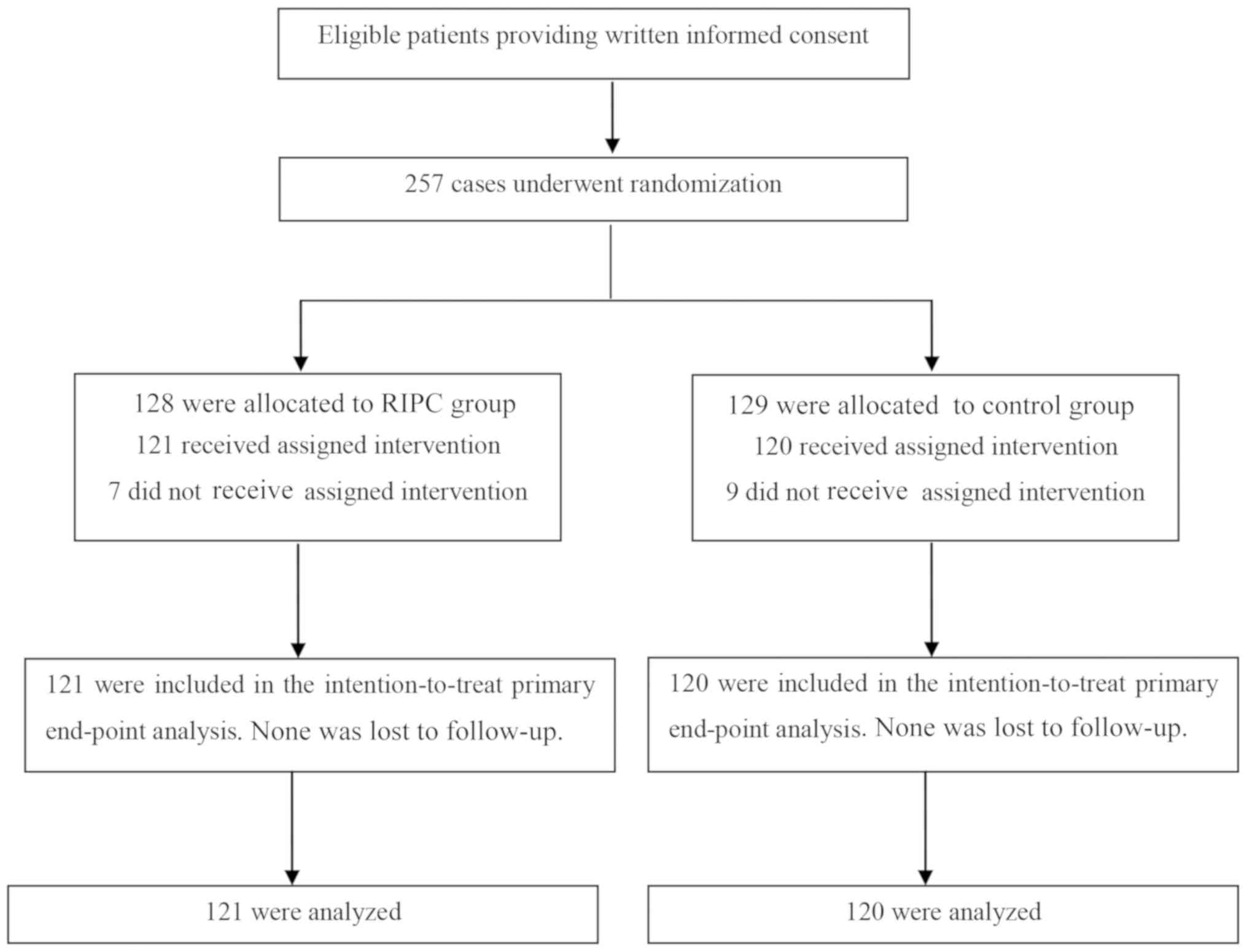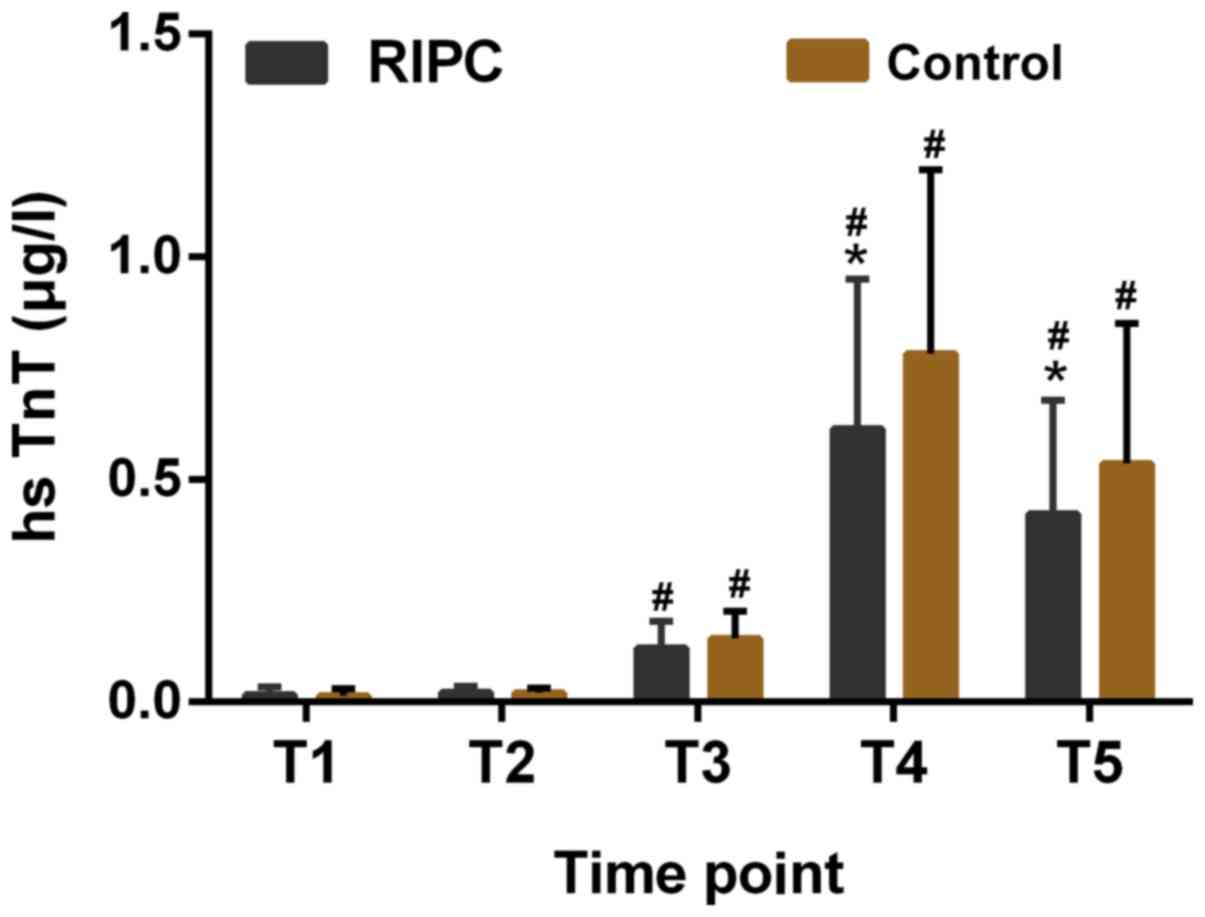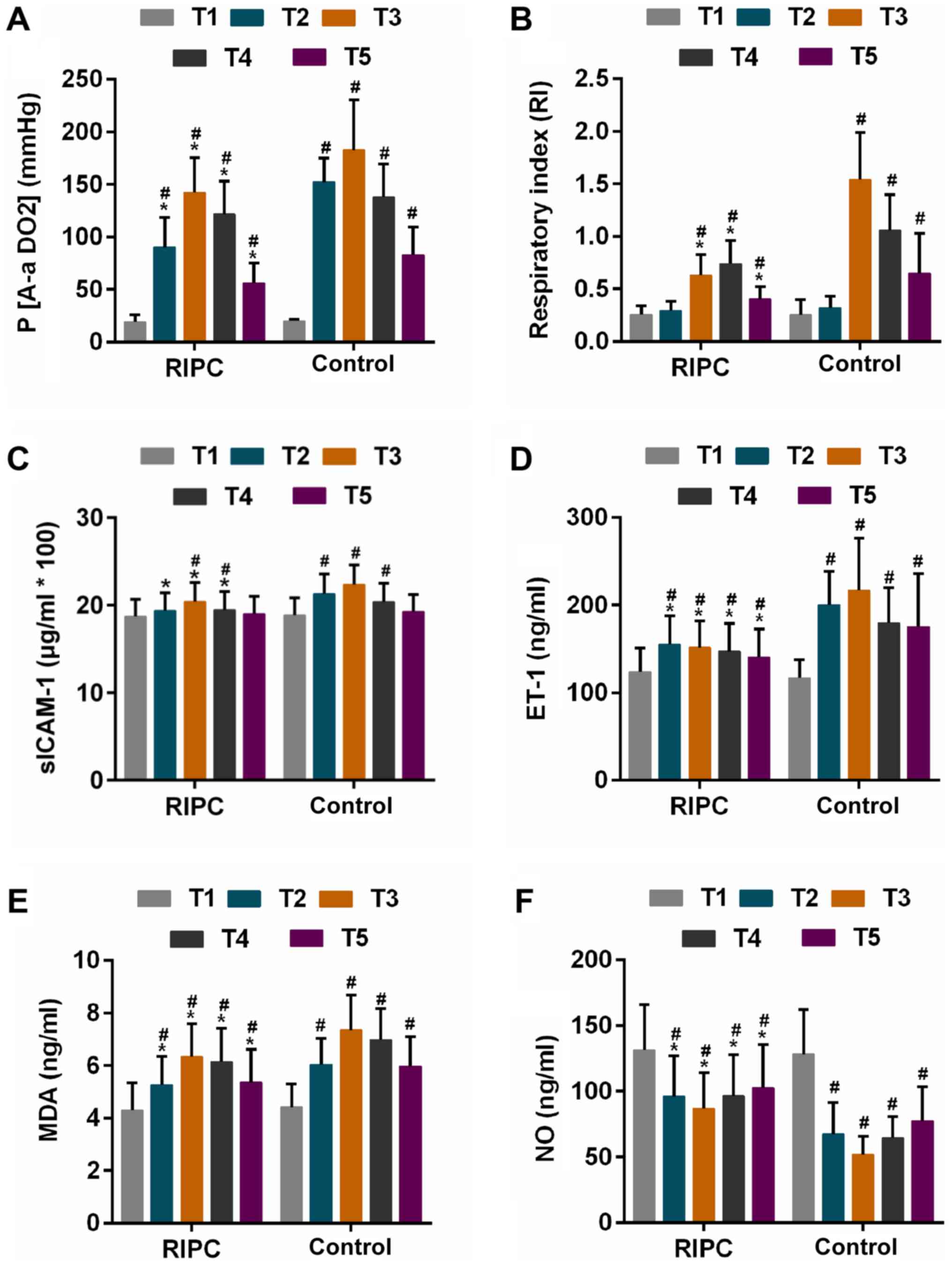|
1
|
Ignarro LJ, Buga GM, Wood KS, Byrns RE and
Chaudhuri G: Endothelium-derived relaxing factor produced and
released from artery and vein is nitric oxide. Proc Natl Acad Sci
USA. 84:9265–9269. 1987. View Article : Google Scholar : PubMed/NCBI
|
|
2
|
Yanagisawa M, Kurihara H, Kimura S, Tomobe
Y, Kobayashi M, Mitsui Y, Yazaki Y, Goto K and Masaki T: A novel
potent vasoconstrictor peptide produced by vascular endothelial
cells. Nature. 332:411–415. 1988. View
Article : Google Scholar : PubMed/NCBI
|
|
3
|
Jalowy A, Schulz R and Heusch G: AT1
receptor blockade in experimental myocardial ischemia/reperfusion.
J Am Soc Nephrol. 10 Suppl 11:S129–S136. 1999.PubMed/NCBI
|
|
4
|
Kubota I, Han X, Opel DJ, Zhao YY, Baliga
R, Huang P, Fishman MC, Shannon RP, Michel T and Kelly RA:
Increased susceptibility to development of triggered activity in
myocytes from mice with targeted disruption of endothelial nitric
oxide synthase. J Mol Cell Cardiol. 32:1239–1248. 2000. View Article : Google Scholar : PubMed/NCBI
|
|
5
|
Bolli R: Cardioprotective function of
inducible nitric oxide synthase and role of nitric oxide in
myocardial ischemia and preconditioning: An overview of a decade of
research. J Mol Cell Cardiol. 33:1897–1918. 2001. View Article : Google Scholar : PubMed/NCBI
|
|
6
|
Yang XM, Proctor JB, Cui L, Krieg T,
Downey JM and Cohen MV: Multiple, brief coronary occlusions during
early reperfusion protect rabbit hearts by targeting cell signaling
pathways. J Am Coll Cardiol. 44:1103–1110. 2004. View Article : Google Scholar : PubMed/NCBI
|
|
7
|
Liu X, Chen H, Zhan B, Xing B, Zhou J, Zhu
H and Chen Z: Attenuation of reperfusion injury by renal ischemic
postconditioning: The role of NO. Biochem Biophys Res Commun.
359:628–634. 2007. View Article : Google Scholar : PubMed/NCBI
|
|
8
|
Hasdai D, Kornowski R and Battler A:
Endothelin and myocardial ischemia. Cardiovasc Drugs Ther.
8:589–599. 1994. View Article : Google Scholar : PubMed/NCBI
|
|
9
|
Lang SC, Elsässer A, Scheler C, Vetter S,
Tiefenbacher CP, Kübler W, Katus HA and Vogt AM: Myocardial
preconditioning and remote renal preconditioning-identifying a
protective factor using proteomic methods? Basic Res Cardiol.
101:149–158. 2006. View Article : Google Scholar : PubMed/NCBI
|
|
10
|
Zhou W, Zeng D, Chen R, Liu J, Yang G, Liu
P and Zhou X: Limb ischemic preconditioning reduces heart and lung
injury after an open heart operation in infants. Pediatr Cardiol.
31:22–29. 2010. View Article : Google Scholar : PubMed/NCBI
|
|
11
|
Tuttolomondo A, Pecoraro R, Casuccio A, Di
Raimondo D, Buttà C, Clemente G, Della Corte V, Guggino G, Arnao V,
Maida C, et al: Peripheral frequency of CD4+ CD28- cells in acute
ischemic stroke: Relationship with stroke subtype and severity
markers. Medicine (Baltimore). 94:e8132015. View Article : Google Scholar : PubMed/NCBI
|
|
12
|
Tuttolomondo A, Pedone C, Pinto A, Di
Raimondo D, Fernandez P, Di Sciacca R and Licata G; Gruppo Italiano
di Farmacoepidemiologia dell'Anziano (GIFA) researchers, :
Predictors of outcome in acute ischemic cerebrovascular syndromes:
The GIFA study. Int J Cardiol. 125:391–396. 2008. View Article : Google Scholar : PubMed/NCBI
|
|
13
|
Di Raimondo D, Tuttolomondo A, Buttà C,
Miceli S, Licata G and Pinto A: Effects of ACE-inhibitors and
angiotensin receptor blockers on inflammation. Curr Pharm Des.
18:4385–4413. 2012. View Article : Google Scholar : PubMed/NCBI
|
|
14
|
Przepiera-Będzak H, Fischer K and Brzosko
M: Serum interleukin-18, Fetuin-A, soluble intercellular adhesion
molecule-1, and endothelin-1 in ankylosing spondylitis, psoriatic
arthritis and SAPHO syndrome. Int J Mol Sci. 17(pii): E12552016.
View Article : Google Scholar : PubMed/NCBI
|
|
15
|
Dröge W: Free radicals in the
physiological control of cell function. Physiol Rev. 82:47–95.
2002. View Article : Google Scholar : PubMed/NCBI
|
|
16
|
Lønborg J, Kelbaek H, Vejlstrup N,
Jørgensen E, Helqvist S, Saunamäki K, Clemmensen P, Holmvang L,
Treiman M, Jensen JS and Engstrøm T: Cardioprotective effects of
ischemic postconditioning in patients treated with primary
percutaneous coronary intervention, evaluated by magnetic
resonance. Circ Cardiovasc Interv. 3:34–41. 2010. View Article : Google Scholar : PubMed/NCBI
|
|
17
|
Hashmi MA, Ahsan B, Shah SIA and Khan MIU:
Antioxidant capacity and lipid peroxidation product in pulmonary
tuberculosis. Al Ame en J Med Sci. 5:313–319. 2012.
|
|
18
|
Muehlschlegel JD, Perry TE, Liu KY,
Nascimben L, Fox AA, Collard CD, Avery EG, Aranki SF, D'Ambra MN,
Shernan SK, et al: Troponin is superior to electrocardiogram and
creatinine kinase MB for predicting clinically significant
myocardial injury after coronary artery bypass grafting. Eur Heart
J. 30:1574–1583. 2009. View Article : Google Scholar : PubMed/NCBI
|
|
19
|
Erdil N, Eroglu T, Akca B, Disli OM,
Yetkin O, Colak MC, Erdil F and Battaloglu B: The effects of
N-acetylcysteine on pulmonary functions in patients undergoing
on-pump coronary artery surgery: A double blind placebo controlled
study. Eur Rev Med Pharmacol Sci. 20:180–187. 2016.PubMed/NCBI
|
|
20
|
Bonservizi WG, Koike MK, Saurim R, Felix
GA, da Silva SM, Montero EF and Taha MO: Ischemic preconditioning
and atenolol on lung injury after intestinal ischemia and
reperfusion in rats. Transplant Proc. 46:1862–1866. 2014.
View Article : Google Scholar : PubMed/NCBI
|
|
21
|
Przyklenk K, Bauer B, Ovize M, Kloner RA
and Whittaker P: Regional ischemic ‘preconditioning’ protects
remote virgin myocardium from subsequent sustained coronary
occlusion. Circulation. 87:893–899. 1993. View Article : Google Scholar : PubMed/NCBI
|
|
22
|
Hausenloy DJ and Yellon DM: Remote
ischaemic preconditioning: Underlying mechanisms and clinical
application. Cardiovasc Res. 79:377–386. 2008. View Article : Google Scholar : PubMed/NCBI
|
|
23
|
Sivaraman V, Pickard JM and Hausenloy DJ:
Remote ischaemic conditioning: Cardiac protection from afar.
Anaesthesia. 70:732–748. 2015. View Article : Google Scholar : PubMed/NCBI
|
|
24
|
Heusch G, Bøtker HE, Przyklenk K,
Redington A and Yellon D: Remote ischemic conditioning. J Am Coll
Cardiol. 65:177–195. 2015. View Article : Google Scholar : PubMed/NCBI
|
|
25
|
Young PJ, Dalley P, Garden A, Horrocks C,
La Flamme A, Mahon B, Miller J, Pilcher J, Weatherall M, Williams
J, et al: A pilot study investigating the effects of remote
ischemic preconditioning in high-risk cardiac surgery using a
randomised controlled double-blind protocol. Basic Res Cardiol.
107:2562012. View Article : Google Scholar : PubMed/NCBI
|
|
26
|
Rahman IA, Mascaro JG, Steeds RP,
Frenneaux MP, Nightingale P, Gosling P, Townsend P, Townend JN,
Green D and Bonser RS: Remote ischemic preconditioning in human
coronary artery bypass surgery: From promise to disappointment?
Circulation. 122:9266672010. View Article : Google Scholar
|
|
27
|
Venugopal V, Hausenloy DJ, Ludman A, Di
Salvo C, Kolvekar S, Yap J, Lawrence D, Bognolo J and Yellon DM:
Remote ischaemic preconditioning reduces myocardial injury in
patients undergoing cardiac surgery with cold-blood cardioplegia: A
randomised controlled trial. Heart. 95:1567–1571. 2009. View Article : Google Scholar : PubMed/NCBI
|
|
28
|
Hausenloy DJ, Mwamure PK, Venugopal V,
Harris J, Barnard M, Grundy E, Ashley E, Vichare S, Di Salvo C,
Kolvekar S, et al: Effect of remote ischaemic preconditioning on
myocardial injury in patients undergoing coronary artery bypass
graft surgery: A randomised controlled trial. Lancet. 370:575–579.
2007. View Article : Google Scholar : PubMed/NCBI
|
|
29
|
Ali N, Rizwi F, Iqbal A and Rashid A:
Induced remote ischemic pre-conditioning on ischemia-reperfusion
injury in patients undergoing coronary artery bypass. J Coll
Physicians Surg Pak. 20:427–431. 2010.PubMed/NCBI
|
|
30
|
Thielmann M, Kottenberg E, Boengler K,
Raffelsieper C, Neuhaeuser M, Peters J, Jakob H and Heusch G:
Remote ischemic preconditioning reduces myocardial injury after
coronary artery bypass surgery with crystalloid cardioplegic
arrest. Basic Res Cardiol. 105:657–664. 2010. View Article : Google Scholar : PubMed/NCBI
|
|
31
|
Hoole SP, Heck PM, Sharples L, Khan SN,
Duehmke R, Densem CG, Clarke SC, Shapiro LM, Schofield PM,
O'Sullivan M and Dutka DP: Cardiac remote ischemic preconditioning
in coronary stenting (CRISP Stent) study: A prospective, randomized
control trial. Circulation. 119:820–827. 2009. View Article : Google Scholar : PubMed/NCBI
|
|
32
|
Candilio L, Malik A, Ariti C, Barnard M,
Di Salvo C, Lawrence D, Hayward M, Yap J, Roberts N, Sheikh A, et
al: Effect of remote ischaemic preconditioning on clinical outcomes
in patients undergoing cardiac bypass surgery: A randomised
controlled clinical trial. Heart. 101:185–192. 2015. View Article : Google Scholar : PubMed/NCBI
|
|
33
|
Lopez-Calle E, Espindola P, Spinke J, Lutz
S, Nichtl A, Tgetgel A, Herbert N, Marcinowski M, Klepp J, Fischer
T, et al: A new immunochemistry platform for a guideline-compliant
cardiac troponin T assay at the point of care: proof of principle.
Clin Chem Lab Med. 55:1798–1804. 2017. View Article : Google Scholar : PubMed/NCBI
|
|
34
|
Bernard GR, Artigas A, Brigham KL, Carlet
J, Falke K, Hudson L, Lamy M, Legall JR, Morris A and Spragg R: The
American-European consensus conference on ARDS. Definitions,
mechanisms, relevant outcomes and clinical trial coordination. Am J
Respir Crit Care Med. 149:818–824. 1994. View Article : Google Scholar : PubMed/NCBI
|
|
35
|
Zhang C, Gong W, Liu H, Guo Z and Ge S:
Inhibition of matrix metalloproteinase-9 with low-dose doxycycline
reduces acute lung injury induced by cardiopulmonary bypass. Int J
Clin Exp Med. 7:4975–4982. 2014.PubMed/NCBI
|
|
36
|
Pilcher JM, Young P, Weatherall M, Rahman
I, Bonser RS and Beasley RW: A systematic review and meta-analysis
of the cardioprotective effects of remote ischaemic preconditioning
in open cardiac surgery. J R Soc Med. 105:436–445. 2012. View Article : Google Scholar : PubMed/NCBI
|
|
37
|
Karuppasamy P, Chaubey S, Dew T, Musto R,
Sherwood R, Desai J, John L, Shah AM, Marber MS and Kunst G: Remote
intermittent ischemia before coronary artery bypass graft surgery:
A strategy to reduce injury and inflammation? Basic Res Cardiol.
106:511–519. 2011. View Article : Google Scholar : PubMed/NCBI
|
|
38
|
Adabag AS, Wassif HS, Rice K, Mithani S,
Johnson D, Bonawitz-Conlin J, Ward HB, McFalls EO, Kuskowski MA and
Kelly RF: Preoperative pulmonary function and mortality after
cardiac surgery. Am Heart J. 159:691–697. 2010. View Article : Google Scholar : PubMed/NCBI
|
|
39
|
Mazzeffi M, Kassa W, Gammie J, Tanaka K,
Roman P, Zhan M, Griffith B and Rock P: Preoperative aspirin use
and lung injury after aortic valve replacement surgery: A
retrospective cohort study. Anesth Analg. 121:271–277. 2015.
View Article : Google Scholar : PubMed/NCBI
|
|
40
|
Zimmerman RF, Ezeanuna PU, Kane JC,
Cleland CD, Kempananjappa TJ, Lucas FL and Kramer RS: Ischemic
preconditioning at a remote site prevents acute kidney injury in
patients following cardiac surgery. Kidney Int. 80:861–867. 2011.
View Article : Google Scholar : PubMed/NCBI
|
|
41
|
Karu I, Tahepold P, Ruusalepp A, Reimann
E, Koks S and Starkopf J: Exposure to sixty min of hyperoxia
upregulates myocardial humanins in patients with coronary artery
disease-a pilot study. J Physiol Pharmacol. 66:899–906.
2015.PubMed/NCBI
|
|
42
|
Pinheiro DF, Fontes B, Shimazaki JK,
Heimbecker AM, Jacysyn Jde F, Rasslan S, Montero EF and Utiyama EM:
Ischemic preconditioning modifies mortality and inflammatory
response. Acta Cir Bras. 31:1–7. 2016. View Article : Google Scholar : PubMed/NCBI
|
|
43
|
Ucar G, Topaloglu E, Kandilci HB and
Gümüsel B: Effect of ischemic preconditioning on reactive oxygen
species-mediated ischemia-reperfusion injury in the isolated
perfused rat lung. Clin Biochem. 38:681–684. 2005. View Article : Google Scholar : PubMed/NCBI
|
|
44
|
Imai Y, Kuba K, Neely GG,
Yaghubian-Malhami R, Perkmann T, van Loo G, Ermolaeva M, Veldhuizen
R, Leung YH, Wang H, et al: Identification of oxidative stress and
Toll-like receptor 4 signaling as a key pathway of acute lung
injury. Cell. 133:235–249. 2008. View Article : Google Scholar : PubMed/NCBI
|
|
45
|
Victorino GP, Wisner DH and Tucker VL:
Basal release of nitric oxide and its interaction with endothelin-1
on single vessel hydraulic permeability. J Trauma. 50:535–539.
2001. View Article : Google Scholar : PubMed/NCBI
|

















